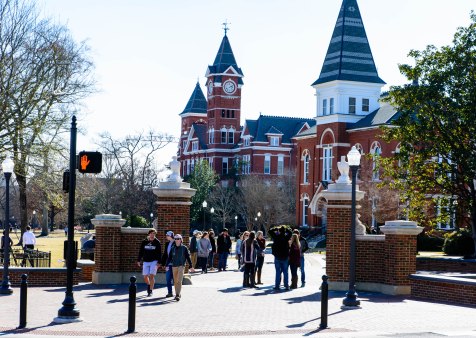By Jaclyn Weiner

Auburn University requires students to divulge all arrests, even if they were not convicted. Courtesy of Flickr
Many colleges throughout the country question applicants on their criminal history. According to a study done by the Center for Community Alternatives, a non-profit agency that promotes justice and a reduced reliance on incarceration, 66 percent of colleges ask applicants about their criminal history.
This occurs regardless of a conviction or the level of severity of the crime. This has the potential to produce unfair discrimination against committers of non-violent crimes and those proven not guilty of crimes.
Additionally, this type of questioning can contribute to the racial disparity that occurs within the college admission process, due to the fact that minorities more frequently face arrest.
Several colleges, such as Auburn University and Alabama University, that have received complaints about their criminal history questions have assured that answering “yes” does not immediately bar students from being accepted into these universities. Though they make this claim, it is hard to believe that no discrimination occurs depending on applicant answers.
Even though the American justice system considers defendants innocent until proven guilty, this is not always how human nature works. It is common for individuals to assume guilt despite the assumption of innocence that our legal system supposedly boasts.
Since it is a human and not a computer, or even a jury, reviewing applications, it can be fair to assume that someone’s criminal history will weigh on the mind of the reviewers of college applications.
Plea bargaining should also be taken into consideration when discussing the issue of criminal history on applications. The Bureau of Justice Assistance of the U.S. Department of Justice (BJA) found that 90 to 95 percent of cases result in plea bargaining.
Though taking a plea bargain may sound like an admission of guilt, this is not always the case. Many take plea bargains for lesser sentences when chances of winning a case that goes to trial are not favorable. The BJA found that those who take pleas are more likely to get a lesser sentence from accepting a plea bargain rather than going to trial. U.S. District Judge Jed S. Rakoff states in his article “Why Innocent People Plead Guilty,” that as much as eight percent of convicted felons who are innocent plead guilty.
This means that many applicants who are forced to reveal their criminal history could very well be innocent, though they may have pleaded guilty.
The criminal history questioning on college applications that occurs also contributes to racial issues. There are high rates of school discipline and incarceration of people of color and this can affect the racial admission disparity. A study done by USA Today found that at least 70 police departments throughout the country arrest black people 10 times more than non-blacks.
The Center on Juvenile and Criminal Justice found that nationwide, African-Americans represent 26 percent of juvenile arrests, 44 percent of youth who are detained, 46 percent of the youth who are judicially waived to criminal court and 58 percent of the youth admitted to state prisons. There are many factors that contribute to this disparity, but some include biased policing, and economic and educational gaps. With the current state of the nation, it is unfair for universities not to take it into serious consideration.
Additionally, having a college diploma versus having a high school diploma affects the quality of life, at least economically, and economics affect crime statistics. Rejecting those with a criminal history may affect crimes committed in the future.
The Pew Research Center, a nonpartisan American think tank which provides information on social issues, public opinion and demographic trends shaping the United States and the world, found that millennials that are between the ages of 25 and 32 with a bachelor’s degree earn $17,500 more than those with a high school diploma.
21.8 percent of millennials between 25 and 32 with just a high school diploma live in poverty, while only 5.8 percent of those with bachelor degrees live in poverty.
The Bureau of Justice Assistance found that persons in poor households at or below the Federal Poverty Level had more than double the rate of violent victimization as persons in high-income households.
Lack of a college-level education links to poverty, and both education and poverty affect rates of crime. Colleges discriminating against those with any type of criminal history can potentially aggravate the issue, creating individuals that are even more susceptible to further criminal activity.
It is important for colleges to assess their policies on the relevance of applicant criminal history. Knowing committers of violent crimes may be beneficial to the safety of college attendees, but by forcing applicants to detail criminal history, regardless of the type of crime or innocence of the individual, it has the potential to breed discrimination, to further admission racial disparity and to perpetuate the links between poverty, education and crime.
Jaclyn Weiner, FCRH ’18, is communication and media studies major from Wantagh, New York.
